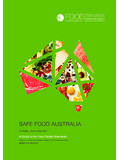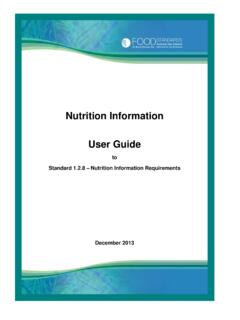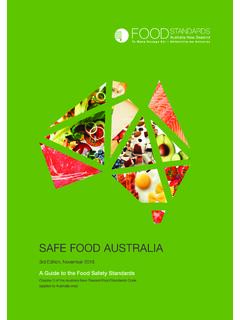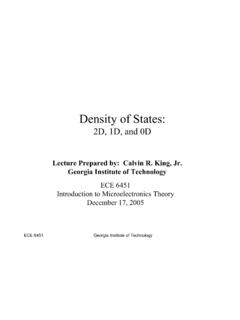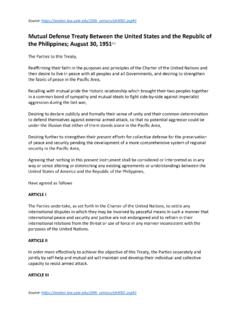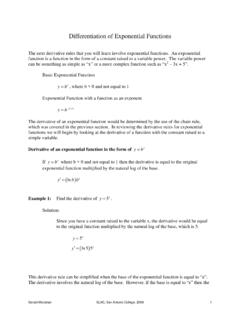Transcription of FOOD INDUSTRY RECALL PROTOCOL
1 food INDUSTRY RECALL PROTOCOLINFORMATION ON recalling food IN AUSTRALIA AND WRITING A food RECALL PLAN7th Edition May 2014 food Standards Australia New Zealand 2014 ISBN 978-0-642-34584-4 Published May 2014 First published 1994 Revised and reprinted 2nd Edition 1997 Revised and reprinted 3rd Edition 2000 Revised and reprinted 4th Edition July 2001 Revised and reprinted 5th Edition September 2002 Reprinted, 5th Edition June 2004 Revised and reprinted 6th Edition February 2009 food Standards Australia New Zealand (FSANZ) supports and encourages the dissemination and exchange of information. Information in this publication is provided under a Creative Commons Attribution Australia (CC BY ) Licence, except for the food Standards Australia New Zealand logo. An electronic version of this work is available on the FSANZ website at and, for New Zealand, Attribution You may copy, distribute, transmit and adapt the material in this publication by the CC BY licence for commercial and non-commercial purposes; but you must attribute the work in the following manner: food Standards Australia New attribution must not, in any way, suggest that FSANZ endorses you or your use of the work.
2 For more information email FSANZ Australia PO Box 7186 Canberra BC ACT 2610 Australia P +61 2 6271 2222 F +61 2 6271 2656 FSANZ New Zealand PO Box 10559, The Terrace Wellington 6143 New Zealand P +64 4 978 5630 F +64 4 473 9855 food INDUSTRY RECALL PROTOCOLINFORMATION ON recalling food IN AUSTRALIA AND WRITING A food RECALL PLAN7th Edition May 2014 food STANDARDS AUSTRALIA NEW ZEALAND2 CONTENTSSECTION 1 INTRODUCTION What is the purpose of this PROTOCOL ? What does the PROTOCOL cover? Does my food business need a food RECALL plan? Who initiates a food RECALL ? What is FSANZ s role in food recalls? Definitions 7 SECTION 2 RESPONSIBILITIES DURING A food RECALL food business/sponsor Distributors food retailers The home state Local government FSANZ RECALL coordinator ACCC 13 SECTION 3 THE food RECALL PROCESS Identification and assessment of an issue RECALL or withdrawal Conducting a RECALL Level of RECALL Scope of RECALL Identifying food businesses who have received recalled food Notifying FSANZ and home state Information requirements Commercially sensitive information Notifying customers and the public Customers The public Retrieving food product food product disposal Post RECALL reporting Interim report Final report 25 food INDUSTRY RECALL PROTOCOL3 SECTION 4 LEGAL REQUIREMENTS The Australia New Zealand food Standards Code food receipt food RECALL Traceability food
3 Disposal The Competition and Consumer Act Notifying food recalls (product sold domestically) Notification of food recalls (exported product) Responsibilities of the Minister under the Australian Consumer Law The state and territory food Acts 29 SECTION 5 ATTACHMENTS 30 Attachment 1 Writing a food RECALL plan 30 Attachment 2 Contact details for FSANZ, Australian state and territory food enforcement agencies and the ACCC 36 Attachment 3 food RECALL checklist 37 Attachment 4 Classifying food recalls 38 Attachment 5 Examples of problems and suggested action 40 Attachment 6 Deciding whether to RECALL or withdraw 41 Attachment 7 Template to notify customers of the RECALL 42 Attachment 8 Example advertisements 43 Attachment 9 Example of a RECALL distribution list 44 food STANDARDS AUSTRALIA NEW ZEALAND4 SECTION What is the purpose of this PROTOCOL ?
4 The food INDUSTRY RECALL PROTOCOL ( PROTOCOL ) provides information on recalling food in Australia and guidance for food businesses on developing a written food RECALL plan. A food RECALL is action taken to remove from distribution, sale and consumption, food which is unsafe. This means food that may cause illness or other physical harm to a person consuming the food . The three primary objectives of a food RECALL are to: stop the distribution and sale of the product as soon as possible inform the government, the food businesses that have received the recalled food and the public (consumer level recalls only) of the problem effectively and efficiently remove unsafe product from the market PROTOCOL provides guidance only and is not legally binding; however it outlines legal requirements relating to food recalls that are enforceable by the state and territory governments.
5 food Standards Australia New Zealand (FSANZ) developed the PROTOCOL in consultation with Australian state and territory governments and the food INDUSTRY . RECALL systems should be tailored to the individual needs of a food business. A business may seek independent advice (including legal advice) about the system it develops for food PROTOCOL does not apply to recalls conducted in New Zealand. The New Zealand Ministry for Primary Industries (NZ MPI) coordinates recalls in New Zealand. FSANZ and the NZ MPI liaise regularly on food recalls to establish whether any food subject to a RECALL has been exported to Australia or New Zealand. SECTION 1 INTRODUCTIONFOOD INDUSTRY RECALL What does the PROTOCOL cover?This PROTOCOL helps food businesses plan for and respond to a need to RECALL potentially unsafe food by setting out: the roles and responsibilities of food businesses and government during a food RECALL the key steps in the food RECALL process the legal requirements for food businesses in relation to food recalls important elements of a food RECALL provided include: writing a food RECALL plan for your food business contact details for FSANZ and state/territory food enforcement agencies an explanation of how recalls are classified flow diagram to assist with deciding if food should be recalled or withdrawn examples of problems and suggested actions examples of RECALL notifications and press Does my food business need a food RECALL plan?
6 The Australia New Zealand food Standards Code (the Code) requires manufacturers, wholesalers and importers of food to have a system in place to manage the RECALL of unsafe food . The requirement is specified in clause 12 of Standard food Safety Practices and General Requirements. It states that:A food business engaged in the wholesale supply, manufacture or importation of food must a) have in place a system to ensure the RECALL of unsafe food ;b) set out this system in a written document and make this document available to an authorised officer on request; andc) comply with this system when recalling unsafe food RECALL plan is the written document a food business produces detailing their RECALL system. It enables a food business to RECALL unsafe food from the marketplace and consumers, effectively and efficiently in order to protect public health and safety.
7 Guidance for food businesses on writing a food RECALL plan is included at Attachment 1. State/territory and/or local government may review a food business s RECALL plan during inspections and audits of the business. SECTION 1 INTRODUCTIONFOOD STANDARDS AUSTRALIA NEW Who initiates a food RECALL ?The food business with primary responsibility for the supply of a food product (sponsor) normally initiates food RECALL action. However, the Commonwealth Minister responsible for consumer affairs and state and territory food enforcement agencies have the legislative power to order a food RECALL when a serious public health and safety risk action may be taken as a result of the food business s own verification/testing procedures, or from reports the food business receives from any one of a number of sources ( a manufacturer, wholesaler, retailer, government or a consumer) which gives them reason to believe a product they have supplied is unsafe.
8 food businesses need to contact FSANZ and the state or territory food enforcement agency where the head office of their business is located, as soon as they consider a food RECALL is, or may be, needed (see Attachment 2 for government contact details). What is FSANZ s role in food recalls?FSANZ is an Australian Government statutory authority that develops food standards jointly with New Zealand. FSANZ develops and administers the Code, which includes requirements for the labelling of food , composition of food , safe handling of food , food additives and genetically modified foods. Enforcement and interpretation of the Code is the responsibility of state and territory departments and food agencies in Australia and New Zealand. The food Standards Australia New Zealand Act 1991 (FSANZ Act 1991) specifies the functions of FSANZ. One of FSANZ s functions is responsibility for coordinating RECALL action, at the request of the Australian states and territories.
9 This means that when FSANZ is notified of a food RECALL , it liaises with the food business and state and territory government to gather and collate all necessary information. This information is then disseminated to state and territory governments, other government bodies and the food INDUSTRY . FSANZ, in consultation with state and territory governments, also monitors the effectiveness of food recalls on behalf of the Australian Competition and Consumer Commission (ACCC). The ACCC is obliged to satisfy the Parliamentary Secretary to the Treasurer, who is responsible for consumer affairs, that a RECALL has been conducted satisfactorily and that consumers have been 1 INTRODUCTIONFOOD INDUSTRY RECALL DefinitionsDefinitions for terms used in this PROTOCOL are listed Competition and Consumer Commission (ACCC)The Australian Competition and Consumer Commission (ACCC) is an independent Commonwealth statutory authority which enforces the Competition and Consumer Act 2010 and a range of additional legislation, promoting competition, fair trading and regulation of national informationDistribution information is information about the types of food businesses the recalled food product was sold to and helps consumers identify where the product was available for sale The recalled food product is sold at the following retail outlets.
10 Woolworths (all stores nationally), Coles/Bi Lo (all stores nationally), Metcash/IGA (all stores nationally) and Franklins (NSW only).Distribution list A distribution list contains contact information for the businesses who received the food being recalled. Contact information should include the name and address of each food business, contact person and phone number and needs to be in English. This information is not circulated to the public, but is circulated to the state and territory action officers and other government bodies so they can ensure these businesses remove the recalled food from sale. An example of a distribution list has been included at Attachment 9 and an Excel template is available from the FSANZ website at the context of a food RECALL , a distributor is a food business that sells food to other food businesses such as other distributers, wholesalers, retailers, food service and caterers.


